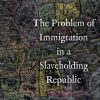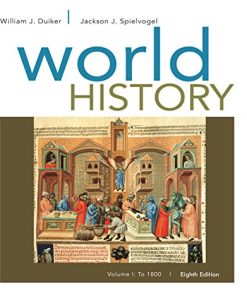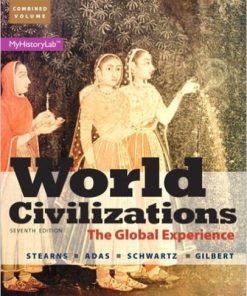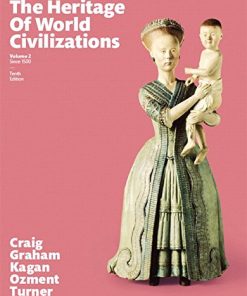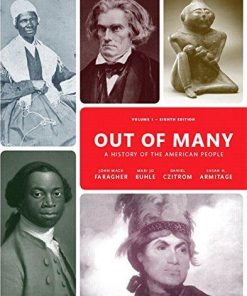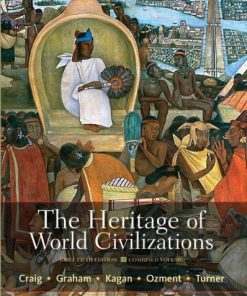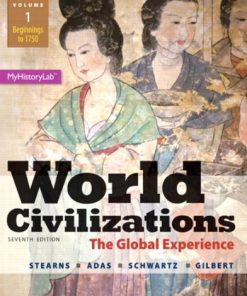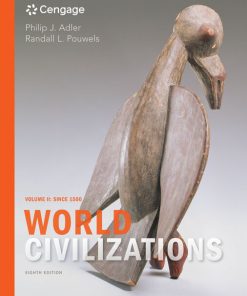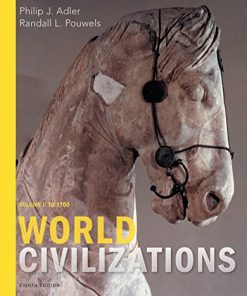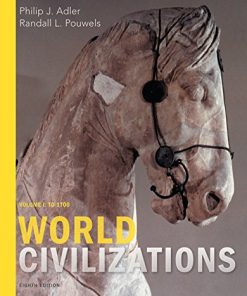(Ebook PDF) World Civilizations Volume 1 To 1700 8th Edition by Philip Adler 9798214356303 full chapters
$50.00 Original price was: $50.00.$25.00Current price is: $25.00.
World Civilizations Volume 1: To 1700 8th Edition by Philip J. Adler – Ebook PDF Instant Download/DeliveryISBN: 9798214356303
Full download World Civilizations Volume 1: To 1700 8th Edition after payment.
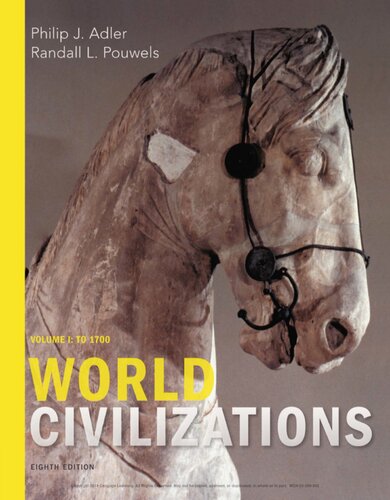
Product details:
ISBN-13 : 9798214356303
Author : Philip J. Adler
For an accessible, comprehensive global survey of the world’s major civilizations, Adler and Pouwels’s WORLD CIVILIZATIONS offers a great balance between detail and brevity. This unique student-oriented text offers 53 short chapters accompanied by strong pedagogy and critical thinking tools, giving instructors the flexibility to assign a wide range of major topics in world history in a variety of different ways, while making learning more manageable for students. The focused treatment of topics throughout history covers every major epoch and follows broad patterns and processes, while illuminating history through specific examples and a particular emphasis on social and cultural topics. This edition is available in MindTap, an online learning experience that guides students through the course by combining the complete textbook with interactive multimedia, new chapter and unit activities, and study tools that assist instructors in keeping students engaged with the material.
World Civilizations Volume 1: To 1700 8th Table of contents:
Unit I. From Human Origins to Agrarian Communities c. 100,000–500 B.C.E.
1. The Earliest Human Societies
A Few Definitions of Terms
The Evolving Past
The Paleolithic Age
Human Development During the Paleolithic
The Neolithic Age: Agriculture and Livestock Breeding
Agrarian and Irrigation Civilizations
Metal and Its Uses
Summary
Key Terms
For Further Reflection
2. Mesopotamia
Neolithic Southwest Asia
Sumerian Civilization
Earning a Living
Religion and the Afterlife
Mathematics and Chronology
The Evolution of Writing
Law
Government and Social Structure
Women’s Rights, Sex, and Marriage
An Expansion of Scale and Trade
Successors to Sumeria
The Decline of Mesopotamia in World History
Summary
Key Terms
For Further Reflection
3. Early Africa and Egypt
African Geography and Climates
Africa’s Neolithic Revolution
The Bantu Expansion into Subequatorial Africa
Early Civilizations of the Nile Valley
The Land and People of Egypt
The Pharaoh: Egypt’s God-King
Government Under the Pharaohs
The Old Kingdom, Middle Kingdom, and New Kingdom
Cultural Achievements
Philosophy, Religion, and Eternal Life
Trade and Egypt’s Influence on Africa
Kush and Meroe
Summary
Key Terms
For Further Reflection
4. Central Asia and India’s Beginnings
Indus Valley Civilization and Early Trade
Mohenjo-Daro and Harappa
Early Civilizations of Central Asia
India’s Vedic Epoch
Beginnings of the Caste System
Brahmanism and the Origins of Hinduism
Daily Life and the Position of Women
Buddhism
The Mauryan Dynasty
Trade and the Spread of Buddhism
Summary
Key Terms
For Further Reflection
5. Ancient China to 221 b.c.e.
Earliest China: The Shang Dynasty (1700–1045 b.c.e.)
The Zhou Dynasty (1045–256 b.c.e.)
Writing
Culture and Daily Life Under the Zhou
Metals, Salt, and Silk
The Confucian and Daoist Philosophies
Confucianism
Daoism
Other Rivals
Legalism
Moism
Summary
Key Terms
For Further Reflection
6. Settlement of the Americas and the Pacific Islands
Paleoindian Period in the Americas
North America’s Archaic Period
Early Woodland Societies
The Agricultural Revolution in the Americas
Mesoamerica and the Olmec Civilization
Early Andean Chiefdoms and the Chavín Civilization
Ancestral Polynesians and the Settlement of Oceania
Summary
Key Terms
For Further Reflection
Putting It All Together
Unit II. Classical Civilizations of the World, 500 B.C.E.–800 C.E.
7. New Civilizations and Empires in Western and Central Asia
The Assyrian Empire
The Phoenicians
The Persians
The Achaemenid Persian Empire
The Hebrews
Jewish Religious Belief and Its Evolution
Economic Change and Social Customs
A Changing Theology
Summary
Key Terms
For Further Reflection
8. The Greek Adventure
Geography and Political Development
The Minoan and Mycenaean Civilizations
Early Hellenic Civilization
Athens and Sparta
Early Athens
Athenian Democracy
Spartan Militarism
The Persian Wars
The Peloponnesian War
The Final Act in Classical Greece
Alexander and the Creation of a World Empire
A Mixed Culture
Greeks and Easterners in the Hellenistic Kingdoms
Summary
Key Terms
For Further Reflection
9. Greek Humanism, 800–100 b.c.e.
Philosophy: The Love of Wisdom
Pre-Socratic Philosophy
The Classical Age: Socrates, Plato, and Aristotle
Three Hellenistic Philosophies
Science
Greek Religion
The Arts and Literature
Society and Economy
Slavery
Gender Relations
The Greek Legacy
Summary
Key Terms
For Further Reflection
10. Rome: From City-State to Empire
Roman Foundations
Republican Government
Rome’s Conquest of Italy
The Punic Wars
The Conquest of the East
The Crisis of the Late Republic
The Triumvirates
The Augustan Age and the Beginnings of the Empire
Augustus’s Reforms
Imperial Government Policies
Peace and Prosperity
The Succession Problem
Imperial Unification
Rome’s Growing Presence in the World
Roman Culture
Law
The Arts
Roman Beliefs
Society and Economy
Slave and Free
Gender Relations
Children and Education
Summary
Key Terms
For Further Reflection
11. The Roman Empire and the Rise of Christianity in the West, 31 b.c.e.–800 c.e.
Internal Upheaval and Invading Peoples
Restructuring of the Empire
Christianity
The Appeal of Christianity
Christianity’s Spread and Official Adoption
Early Church Organization and Doctrine
The Byzantine Empire
Germanic Invaders
German Customs and Society
Conversion to Christianity
Foundations of the Medieval Manor
Europe’s Era of Late Antiquity, c. 500–800 c.e.
Charlemagne and the Holy Roman Empire
Carolingian Renaissance
Disintegration of the Carolingian Empire
Renewed Invasions
Development of the Manorial System
Summary
Key Terms
For Further Reflection
12. Iran, India, and “Global” Trade
The New Persian Empires
Revival Under the Parthians
Expansion Under the Sassanians (224–661 c.e.)
The Kushan Empire, Long-Distance Trade, and the Buddhist Community
The Gupta Dynasty
Economic and Cultural Progress
Political Fragmentation: South and North
South: Hinduism and Buddhism
North: Islam Comes to India
Hindu Doctrines in the Classical Age
Development of the Caste System
Social Customs
India and Southeast Asia
Summary
Key Terms
For Further Reflection
13. Imperial China in Its Golden Age
The Qin Emperor: Foundation of the State
The Han Dynasty, 202 b.c.e.–220 c.e.
Arts and Sciences
The Economy, Government, and Foreign Affairs
The End of the Dynasty
The Tang Dynasty, 618–907 c.e.
Buddhism and Chinese Culture
Summary
Key Terms
For Further Reflection
Putting It All Together
Unit III. The Post-Classical Era, c. 650–1500 C.E.
14. The Americas to the Fifteenth Century
Mesoamerican Civilizations
The Maya
Teotihuacan
The Aztecs
The Inca
North Americans
Civilizations of the American Southwest
The Middle and Late Woodlands Civilizations
Summary
Key Terms
For Further Reflection
15. Islam
The Life of Muhammad the Prophet
Patterns of Belief in Islamic Doctrine
Arabia in Muhammad’s Day
The Jihad
The Caliphate
The Era of the Rightly Guided Caliphs, 632–661
The Umayyad Dynasty, 661–750
The Abbasid Dynasty, 750–1258
Conversion to Islam
Everyday Affairs
Summary
Key Terms
For Further Reflection
16. Mature Islamic Civilization and the First Global Civilization
The Caliphate
Further Development of Islamic Religious Thought
Literature and the Natural Sciences
The Arts in the Muslim World
Marriage and the Status of Women
Decline of the Abbasids and the Coming of the Turks and Mongols
The First “World” Civilization, 632–1500
Summary
Key Terms
For Further Reflection
17. Africa from Axum to 1400
Social Organization and Early State Formation
Axum, an Ethiopian State
Trans-Saharan Trade and Early Kingdoms of the Sudan
Ghana
Mali
Early Kingdoms of the Forests and Woodlands
Ifè
Oyo
Benin
Swahili City-States
Great Zimbabwe
African Arts
Summary
Key Terms
For Further Reflection
18. The Mongols Unify Eurasia
China Under the Song Dynasty, 960–1279
Song Internal Policies
Trade and Foreign Affairs
The Mongols
Pastoral Nomadism Among the Mongols
Chinghis Khan and the Rise of the Mongols
The Conquests
The Mongol Empire and Its Significance
The Yuan Dynasty in China
The Khanate of the Golden Horde in Russia
The Dynasty of the Il Khans in the Middle East
Fragmentation of the Empire
Summary
Key Terms
For Further Reflection
19. Japan and Southeast Asia
Very Early Japan
Buddhism and Shinto
Government and Administration
The Nara and Heian Periods, 710–1185
The Kamakura Period, 1185–1333
Arts and Culture in Medieval Japan
Buddhist Evolution
The Ashikaga Shogunate, 1336–1573
Contacts with China
Korea
The Early Southeast Asian States
Funan and Champa
Kampuchea
Srivijaya
Majapahit
Burma and Thailand
Vietnam
Summary
Key Terms
For Further Reflection
20. The European Middle Ages, c. 800–1500
The Workers
Medieval Serfs
Medieval Agriculture
Urban Workers
The Warriors
The Worshipers
The New Clerical Orders
Economic Revival
Bourgeoisie and Jews
Medieval Culture and Society
The First Universities
Gothic Architecture
Vernacular Literature
Christianity, Marriage, and the Changing Status of Women
Disasters of the Fourteenth Century
The Black Death
The Hundred Years’ War
Problems in the Church
Royal Kingdoms and the Formation of States
Summary
Key Terms
For Further Reflection
21. The Late European Middle Ages and the Renaissance
The Rise of the Italian City-States
The Renaissance Attitude
The Northern Renaissance
The Political Economy of Renaissance Europe
The Theory of the State
Royal Governments
Art and its Patrons
Family Life and the Education of Children
Summary
Key Terms
For Further Reflection
Putting It All Together
Unit IV. Expanding Webs of Interaction c. 1400–1800
22. A Larger World Opens
Maritime Exploration in the 1400s
Overseas Empires and Their Effects
Portuguese Pioneers
The Spanish Empire in the Americas
The African Slave Trade Opens
Dutch and English Merchant-Adventurers
Mercantilism
The Columbian Exchange
European Impacts on the World and Vice Versa
The Fate of the Amerindians
Racism’s Beginnings
Summary
Key Terms
For Further Reflection
23. Religious Division and Political Consolidation in Europe
The Reformation
Luther and the German National Church
Calvin and International Protestantism
The English Reformation
Other Early Protestant Faiths
The Counter-Reformation
Religious Wars and Their Outcomes to 1600
France
The Spanish Netherlands
Legacy of the Reformation
Birth of the Absolutist State
The Thirty Years’ War
The Theory and Practice of Royal Absolutism
French Government Under Louis XIV
Strengths and Weaknesses of French Absolutism
Revolt Against Royal Absolutism: Seventeenth-Century England
The Stuart Monarchy
Civil War: Cromwell’s Commonwealth
Restoration and the Glorious Revolution of 1688
Significance of the Glorious Revolution
Absolutism East of the Elbe
Prussia’s Rise
The Habsburg Domains
Russia Under the Tsars
Summary
Key Terms
For Further Reflection
24. The Gunpowder Empires of Western and Southern Asia
The Ottoman Empire
Ottoman Government
Non-Muslims Under Ottoman Rule
The Zenith of the Ottoman Empire: Suleiman and After
Muslim Empires in Persia and India
The Safavid Realm in Persia
The Mughal Empire in India
Summary
Key Terms
For Further Reflection
25. Africa in the Era of Expansion
New States Appear
West African States, Old and New
The Lakes Kingdoms
The Swahili, the Portuguese, and Oman
European Impressions
The Era of Informal Empire
The Slave Trade and Its Results
Intensification of European Contacts
North Africa
West Africa
South Africa
East Africa
Summary
Key Terms
For Further Reflection
26. China from the Ming through the Early Qing Dynasty
Ming China, 1368–1644
Economic Progress
Urbanization and Technology
The Ming Political System
The Bureaucracy
Dealing with Foreigners
Manzhou Invaders: The Qing Dynasty
Qing Government
Qing Culture and Economy
Progress and Problems
Summary
Key Terms
For Further Reflection
27. Japan and Southeast Asia in the Era of European Expansion
Japan
First European Contacts: Christianity
The Tokugawa Shogunate
Shogun, Emperor, and Daimyo
Economic Advances
Peasants and Urbanites
Taming the Samurai
Tokugawa Arts and Learning
Literature and Its Audiences
Adaptation and Originality
Response to the Western Challenge
Southeast Asia
Summary
Key Terms
For Further Reflection
28. From Conquest to Colonies in Hispanic America
Fall of the Aztec and Inca Empires
The Colonial Experience
Colonial Administration
The Colonies and the Roman Catholic Church
Early Economic Structure
Stagnation and Revival in the Eighteenth Century
Colonial Society and Culture
People also search for World Civilizations Volume 1: To 1700 8th:
the heritage of world civilizations volume 2 pdf
the heritage of world civilizations volume 2
the heritage of world civilizations volume 1
the heritage of world civilizations volume 1 10th edition
world civilizations volume ii since 1500
Tags:
World Civilizations,Philip Adler,global survey,major civilizations,short chapters
You may also like…
Uncategorized
History - American Studies
History - World History
Uncategorized
World Civilizations: Volume I: To 1700 8th Edition E-book PDF Version – Ebook PDF Version


